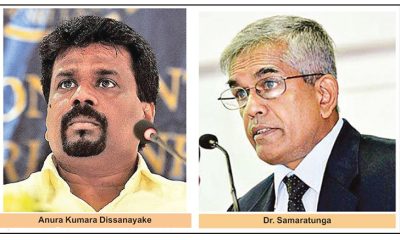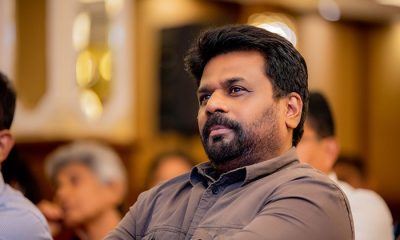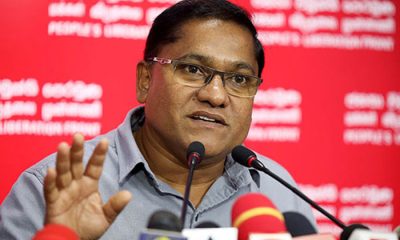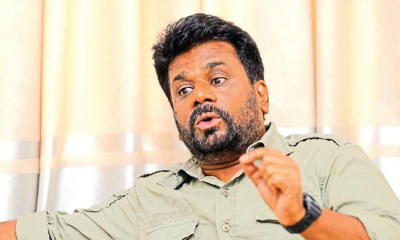News
Aragalaya failed for want of proper leadership, Rajapaksas regained power through Wickremesinghe – JVP
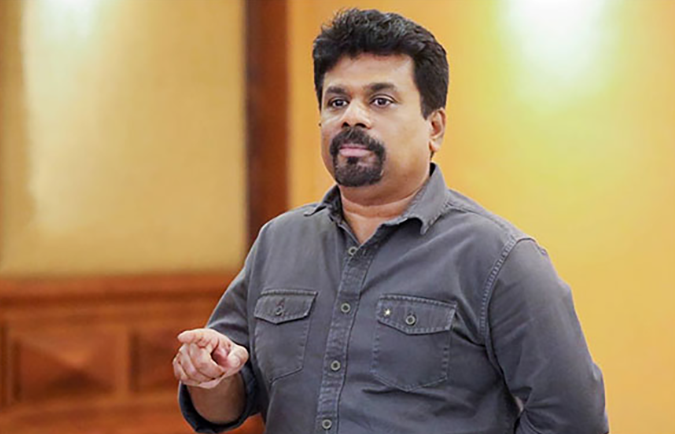
…won’t join coalitions ever again, calls for relentless struggle
By Shamindra Ferdinando
JVP leader Anura Kumara Dissanayake has said that ‘Aragalaya’ failed for want of proper leadership and planning though it compelled Gotabaya Rajapaksa to give up executive powers.
Appearing on ‘Salakuna’ on Hiru, Monday (17) night, MP Dissanayake pointed out that though the Rajapaksas’ power collapsed, as a result of the protest campaign, they were able to quickly regain, and consolidate political power, by installing UNP leader Ranil Wickremesinghe to complete the remainder of Gotabaya Rajapaksa’s term.
Responding to interviewers Chamuditha Samarawickrema, Madushan de Silva and Kalindu Vithanage, MP Dissanayake alleged that the incumbent Wickremesinghe-Rajapaksa administration was as corrupt as successive Rajapaksa administrations.
Speaking on behalf of the Jathika Jana Balavegaya (JJB), a coalition that includes the JVP, lawmaker Dissanayake faulted those who spearheaded ‘Aragalaya’ for bringing the project to an early end.
Having forced Gotabaya Rajapaksa to flee, the protest should have been diverted towards the Parliament.
Protesters’ ultimate objective should have been to force the then government to dissolve Parliament and call for a fresh election, the JVPer said, pointing out that they pressed for the appointment of Speaker Mahinda Yapa Abeywardena as the President temporarily to pave the way for early parliamentary polls.
The JVP leader acknowledged as a result of shortcomings on the part of those who directed ‘Aragalaya,’ the Rajapaksas succeeded in regaining political power. Alleging that President Wickremesinghe, too, had been responsible for the overall deterioration of the national economy, over the past several decades, MP Dissanayake stressed that the public shouldn’t expect him to save the country.
Commenting on Field Marshal Sarath Fonseka’s recent assertion that the ongoing struggle may lead to an armed rebellion, the JVP leader emphasized that his party wouldn’t go on that path again. The JVP launched insurgencies in April 1971 and 1987. Mrs. Sirimavo Bandaranaike’s government crushed the 1971 insurgency within days while the second lasted over four years.
Asked to explain their strategy, MP Dissanayake said that they believed that the government should be relentlessly pressed until it called a general election. “We’ll secure power through elections,” MP Dissanayake said, warning the electorate not to be deceived by the Rajapaksas and Wickremesinghe again.
MP Dissanayake alleged that Samagi Jana Balavegaya (SJB) leader Sajith Premadasa, who is also the Leader of the Opposition, was also part of the utterly corrupt political party system that ruined the country. The SJB leader, as well as the vast majority of those around him, couldn’t absolve themselves of waste, corruption, mismanagement and irregularities though they now pretended to be paragons of virtue.
When the interviewers pointed out that the JJB parliamentary group comprised just three members (Anura Kumara Dissanayake, Vijitha Herath and Dr. Harini Amarasuriya), lawmaker Dissanayake said that it would be a grave mistake, on the part of the electorate to believe the SJB genuinely represented their interests.
Declaring that they were the real Opposition, MP Dissanayake said that the SJB backed the policies of the Wickremesinghe-Rajapaksa government. There couldn’t be a better example than the SJB skipping the vote on the Social Security Contribution Levy to highlight Premadasa’s despicable strategy. Nearly 50 SJB members, including Sajith Premadasa, skipped the vote, though Ajith Mannapperuma, Ashok Abeysinghe and Chief Opposition Whip Lakshman Kiriella were exceptions. Only 10 MPs voted against the Bill whereas 123 skipped the vote. The Parliament ratified the Social Security Contribution Levy in the second week of September, this year, with a majority of 81 votes. The Bill received 91 votes.
MP Dissanayake said that the formation of the SJB should be examined against the backdrop of the split in the UNP, caused by the belief the party couldn’t win under Ranil Wickremesinghe.
The JVP leader said that a major difference between those now exercising power, as well as the SJB and the JVP, was the composition of the Cabinet of Ministers. The JVP believed the Cabinet of Ministers should be restricted to 25 and an equal number of Deputy Ministers whereas the rest were hell bent on expanding the Cabinet of Ministers and accommodating as many State Ministers as possible, at taxpayers’ expense.
Acknowledging the role played by the Tamil National Alliance (TNA), MP Dissanayake, in an obvious reference to the rebel SLPP groups, alleged that they distanced themselves from the government after failing to achieve their objectives, and agendas.
The JVP leader dismissed the interviewers’ assertion that whatever the allegations directed at the incumbent President, he was the most qualified to handle the economy, as baseless. Lawmaker Dissanayake challenged interviewers on the basis that of the USD 15.5 bn loans obtained by way of ISB (International Sovereign Bonds), during the 2007-2020 period, the yahapalana administration had taken USD 12 bn between 2015 and 2019, in addition to USD 1.1 bn received for handing over the Hambantota Port, to China, on a 99-year-lease. President Wickremesinghe owed an explanation in that regard.
Referring to the Colombo High Court, in June this year, sentencing Chief Government Whip Prasanna Ranatunga to two years rigorous imprisonment, suspended for five years, after he was found guilty of one of the charges in a case filed over threatening a businessman, MP Dissanayake said that Sri Lanka’s reputation had been ruined by some of those represented in Parliament. The JVPer said that the recent declaration at the Geneva-based United Nations Human Rights Council (UNHRC) that economic crimes had been perpetrated in Sri Lanka was a warning that the international community wouldn’t recognize Sri Lanka as long as the country didn’t honour its own laws.
Responding to a spate of questions on the JVP’s readiness to form a government of its own, MP Dissanayake insisted that the party wouldn’t, under any circumstances, join other political parties. Referring to the JVP joining the CBK government, in 2004, and backing Sarath Fonseka and Maithripala Sirisena at the 2010 and 2015 presidential elections, MP Dissanayake said that they wouldn’t repeat that strategy.
Commenting on several high profile corruption cases, including reduction of Rs 50 per kilo duty on imported white sugar, to 25 cents, in Oct 2020, Treasury bond scams perpetrated in 2015 and 2016, lawmaker Dissanayake said that those responsible would never be punished. The JVPer claimed that the corrupt would be safe as long as the people failed to elect a JVP-led government.
MP Dissanayake flayed ministers who lived luxurious lives at taxpayers’ expense at a time the vast majority of people struggled to make ends meet. Responding to accusations directed at the JVP by Johnston Fernando, MP Dissanayake alleged that the MP brought a woman suicide cadre to Colombo with a view to assassinating the then President Mahinda Rajapaksa. The attack was to be mounted when the President visited a certain house at Gregory’s Road, MP Dissanayake alleged, claiming that the file pertaining to that particular case disappeared from the Attorney General’s Office. An aide to MP Fernando, while denying the JVP leader’s accusation, said that making unsubstantiated allegations was part of their strategy.
Lawmaker Dissanayake said that those who exercised political power never allowed the police and the Attorney General to proceed with high profile cases. Referring to the Malwana case in which Basil Rajapaksa had been investigated for building a bungalow and the ongoing inquiry into fraudulent activities of Thilini Priyamali, the JVP leader said that politicians didn’t allow the law to take its course. Declaring the Money Laundering Act as a very powerful law, MP Dissanayake claimed that it was not properly implemented in respect of those near and dear to the powers that be.
News
US sports envoys to Lanka to champion youth development

The U.S. Embassy in Colombo welcomed the U.S. Sports Envoys to Sri Lanka, former National Basketball Association (NBA) and Women’s National Basketball Association (WNBA) players Stephen Howard and Astou Ndiaye, from June 8 through 14.
The Public Diplomacy section of the U.S. Embassy said that it would launch a weeklong basketball program intended to harness the unifying power of sports, made possible through collaboration with Foundation of Goodness and IImpact Hoop Lab.
While in Sri Lanka, Howard and Ndiaye, both retired professional basketball players, will conduct a weeklong program, Hoops for Hope: Bridging Borders through Basketball. The Sports Envoys will lead basketball clinics and exhibition matches and engage in leadership sessions in Colombo and Southern Province for youth aged 14-18 from Northern, Uva, Eastern and Western Provinces, offering skills and leadership training both on and off the court. The U.S. Envoys will also share their expertise with the Sri Lanka Basketball Federation, national coaches, and players, furthering the development of basketball in the country. Beyond the clinics, they will collaborate with Sri Lankan schoolchildren to take part in a community service project in the Colombo area.
“We are so proud to welcome Stephen and Astou as our Sports Envoys to Sri Lanka, to build on the strong people-to-people connections between the United States and Sri Lanka,” said U.S. Ambassador Julie Chung. “The lessons that will be shared by our Sports Envoys – communication, teamwork, resilience, inclusion, and conflict resolution – are essential for leadership development, community building, equality, and peace. The U.S. Sports Envoy program is a testament to our belief that sports can be a powerful tool in promoting peace and unity.”
News
Rahuman questions sudden cancellation of leave of CEB employees

SJB Colombo District MP Mujibur Rahuman in parliament demanded to know from the government the reasons for CEB suspending the leave of all its employees until further notice from Thursday.
MP Rahuman said that the CEB has got an acting General Manager anew and the latter yesterday morning issued a circular suspending leave of all CEB employees with immediate effect until further notice.
“We demand that Minister Kanchana Wijesekera should explain this to the House. This circular was issued while this debate on the new Electricity Amendment Bill was pending. There are many who oppose this Bill. The Minister must tell parliament the reason for the urge to cancel the leave of CEB employees,” the MP said.However, Speaker Mahinda Yapa Abeywardena prevented Minister Wijesekera responding to the query and said that the matter raised by MP Rahuman was not relevant.
News
CIPM successfully concludes 8th Annual Symposium

The Chartered Institute of Personnel Management (CIPM) successfully concluded the 8th Annual CIPM Symposium, which took place on 31st May 2024. Themed “Nurturing the Human Element—Redefining HRM in a Rapidly Changing World,” the symposium underscored the pivotal role of human resource management (HRM) in today’s dynamic global landscape. Since its inception in 1959, CIPM has been dedicated to advancing the HR profession through education, professional development, and advocacy, solidifying its position as Sri Lanka’s leading professional body for HRM.
Ken Vijayakumar, the President of the CIPM, graced the occasion as the chief guest. The symposium commenced with the welcome address by the Chairperson, Prof. Arosha Adikaram, followed by the Web Launch of the Symposium Proceedings and Abstract Book by the CIPM President. The event featured distinguished addresses, including a speech by Chief Guest Ken Vijayakumar, President of CIPM, and an address by Guest of Honor Shakthi Ranatunga, Chief Operating Officer of MAS Holdings Pvt. Ltd., Sri Lanka.
The symposium also featured an inspiring keynote address by Prof. Mario Fernando, Professor of Management and Director of the Centre for Cross Cultural Management (CCCM) at the University of Wollongong, Australia.
Vote of Thanks of the inauguration session was delivered by Dr. Dillanjani Weeratunga, Symposium Co-chair.
The symposium served as a comprehensive platform for researchers to present their findings across a wide range of critical topics in HRM. These included Cultural Diversity and Inclusion, Talent Development and Retention, Ethical Leadership and Corporate Social Responsibility, Adapting to Technological Advancements, Mental Health and Well-being at Work, Global Workforce Challenges, Employee Empowerment, and Reskilling and Upskilling.
The plenary session was led by Prof. Wasantha Rajapakse. Certificates were awarded to the best paper presenters during the valedictory session, followed by a vote of thanks delivered by Kamani Perera, Manager of Research and Development.
The annual symposium of CIPM was a truly inclusive event, attracting a diverse audience that spanned undergraduates, graduates, working professionals, research scholars and lecturers. This widespread interest highlights the symposium’s significance in the field of HRM, offering a unique opportunity for everyone to network and learn from scholarly brains.The CIPM International Research Symposium was sponsored by Hambantota International Port, Sri Lanka Institute of Information Technology (SLIIT), E B Creasy & Co. PLC, and Print Xcel Company.


